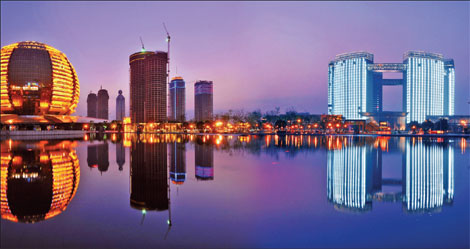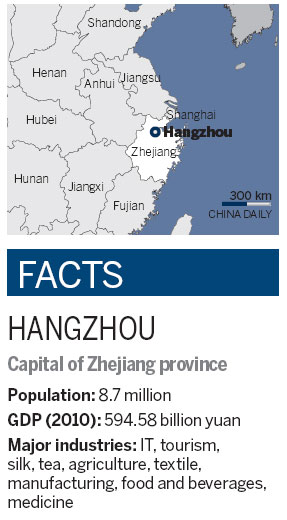
A night view of the Hangzhou Qianjiang New City, the city's central business district. Provided by Hangzhou Information Office
HANG ZHOU - Zhang Buwen is only in his third year of college, but he is already making up to 100,000 yuan ($15,520) a month from a home-grown business he started two years ago. His budding entrepreneurship becomes more impressive with the fact that he is selling postcards, a paper-based trade in an increasingly digitized world.
With less than 10 other students, Zhang produces postcards that include painted images of Hangzhou. The girls in his team also pen messages for the cards that allude to the beauty of Zhejiang's provincial capital, famous for being a cultural center that has inspired poets throughout the ages.
Zhang, 23, maintains that his postcards are necessary precisely because young, IT-reliant people are becoming too detached from the "personal touch" in communication.
"Sometimes I feel that I'm not running a business. I'm actually living my dream," he said.

But the marketing major from Hangzhou Dianzi University also sells most of his cards through 200 shops online - and that is why he is a fitting example of how the city is trying to tap its cultural and creative energies to face the new challenges of the global economy.
Hangzhou is one of China's most developed cities, with a GDP of more than 594.58 billion yuan for 2010 and a double digit annual economic growth rate for 20 consecutive years, government statistics show.
It has a permanent resident population of 8.7 million people and a GDP per capita of more than $10,000.
The city's economic strength lies in sectors ranging from traditional ones such as tea, silk and agriculture to modern and creative fields including IT, animation and medicine.
Tourism also forms a major part of Hangzhou's economy, with the city's iconic West Lake recently making it to UNESCO's World Heritage List.
But the local authorities also built on its lead in new sectors and set the goal of making their city a global hub of creative and cultural industries three years ago.
"Hangzhou is upgrading its cultural and creative industries, by using our history and heritage, to ride on the trends of the global economy," said Lu Zhengpin, deputy director of the city's cultural and creative industry office.
"Hangzhou has invested a lot of effort to realize this goal. For instance, it set up special funds for its cultural and creative industries. Since 2007, it has helped to attract about 15 billion yuan for 1,360 programs in the sectors," he said.
"The local government has also cooperated with nine banks to provide loans to companies of these industries. Last year, 4.5 billion yuan in loans were provided to companies," Lu said.
Hangzhou has also been building industrial parks for the cultural and creative industries.
New parks and zones for the industries covered 1.24 million square meters last year, a year-on-year increase of 85 percent, official figures show.
The number of companies setting up operations in these areas also rose to 1,437, up by 71.68 percent from that of the previous year.
Similarly, there were 23,074 workers in these parks, up by 53.5 percent a year earlier.
"Hangzhou also helps local companies in the cultural and creative industries to go public. It has set up a special investment company to help them get listed. There are preferential policies such as tax incentives for young people to set up their businesses," Lu said.
"All these will help Hangzhou attract more talent. The city is already one of the country's top tourist destinations with its natural scenery, historic sites and comfortable way of life," Lu said.
"Other than the high-tech, economic development zones, we also have hubs to draw the thinkers, innovators and artists so that they can fuel the creative sector."
Many entrepreneurs already credit Hangzhou's business environment for helping to draw businesses.
Alibaba Group Holding Ltd, China's e-commerce giant, is based in Hangzhou.
Jack Ma, Alibaba's chairman and CEO, once explained the reasons behind his group's move to set up its headquarters in the city.
"Hangzhou boasts favorable conditions for e-commerce companies like us. For instance, labor cost here is fairly lower than that of other first-tier cities, and the private economy here is very dynamic, giving birth to many well-developed private companies, providing a rich customer base for us," Ma said.
Taobao, Alibaba's online retail unit, was started as a marketplace for consumers to buy and sell goods to each other. It now controls 80 percent of China's online retail market with its 370 million registered members.
In his latest letter to employees, Ma said the company will not exclude the possibility of listing Alibaba Group.
Many also see the move as a potential tactic to deal with tense
relations between Alibaba and its biggest shareholder, Yahoo! Inc.

Recognizing Hangzhou's position as one of the most vibrant places for the country's e-commerce, the China E-commerce Association dubbed the city "the capital of China's e-commerce" in 2008.
The creative industry is also finding inspiration in Hangzhou in the field of animation.
Last year, the city's animators produced 42 projects, adding up to more than 35,000 minutes of footage than that made in the previous year, official statistics show.
Hangzhou also sold close to 50 original cartoons to 90 regions and countries last year, raking in $11.92 million in overseas sales or 86 percent more than that of the previous year.
At least 10 special zones covering more than 1 million sq m were also completed last year to help develop the creative and cultural sectors.
Animation company Zhejiang Zhongnan Cartoon Co Ltd was founded in 2004 and is located in the Hangzhou Binjiang District, a high-tech industrial park in the city.
Zhongnan has close to 300 employees and recorded 120 million yuan revenue last year, with up to 30 percent of the takings coming from overseas markets.
"We entered the overseas market at the end of 2008 by selling our copyrighted cartoon products to the American Nickelodeon children's channel," said Shen Yuliang, the company's general manager.
"We plan to increase our revenue by at least 30 percent this year and almost 80 percent of it will come from the overseas market," he said.
"Taking overseas market share means competing directly with the big animation companies such as Disney. This is tough for us, because they have a much longer history and are more experienced in the overseas market," Shen said.
"But we have also accumulated a lot of experience and our technologies have largely improved. We have developed our own 3D technology for producing cartoons," he said.
"We have also taken part in MIPTV, a market conference and networking event which has been taking place annually in Cannes, for six consecutive years. That broadens our horizons and our customer sources," Shen said.
"To better tap the overseas market, we have also hired some overseas employees. We now have almost 10 overseas employees in our company. Many of them worked in big Western cartoon companies such as Disney and that makes us more competitive in the overseas market."
Shen also attributes Zhongnan's success to the favorable conditions for the animation industry in Hangzhou.
"Hangzhou is the first Chinese city to roll out policies that support the animation industry. The government has organized national animation fairs to provide wide platforms for us to develop our business," Shen said.
Hangzhou C &L Digital Production Co Ltd is another major animation player that has made significant inroads in the industry.
The studio's 85-minute film The Dreams of Jinsha became one of the 15 animation entries short-listed for the 2011 Oscar nominations for Best Animated Feature, along with this year's winner Toy Story 3 by Walt Disney Pictures and Shrek 4 by Dreamworks.
Jinsha depicts the story of teenager Xiao Long who travels back in time to the Jinsha civilization 3,000 years ago in Southwest China, where he meets the princess Flower. They save forests and towns from evil and celebrate Chinese values of courage and love in the process.
Su Xiaohong, who heads the studio of about 30 people, said Hangzhou's cultural heritage and history are a major draw for them to set up shop in the city.
"This is a great place to live and its attractions serve as a major source of inspiration for us," Su said.
"We will leverage our achievements. Winning awards and being recognized by others is a top priority in this field. We are now turning our attention to Europe, we want to make an impact there."
Apart from modern industries, traditional sectors in Hangzhou are also drawing on the city's cultural heritage to face the global economy.
Leading silk company Wensli Group is one such player finding new ways to build on the city's historic links with the material, which existed as far back as 5,000 years ago in the area.
Founded in 1975, Wensli Group recorded revenue of 2.53 billion yuan last year, an increase of nearly 30 percent from the previous year's figure.
"We plan to get 3 billion yuan this year," said Ma Tingfang, the general manager of Wensli Group.
Wensli has worked with a number of major Western brands such as British luxury fashion house Burberry and now aims to expand its business worldwide.
"We cooperate with these big brands by providing designs and products to them. Up to 30 percent of our exports go to Europe and 40 percent goes to the United States," Ma said.
"But only 60 percent of the exports are our own brands. That is not enough for us to build up our global image."
"We need a stronger image to face new challenges such as the rising cost of raw materials, instead of just 'business as usual' by manufacturing for Western companies."
To help promote its brand abroad, Wensli provided silk products like the qipao dresses worn by medal presenters and more than 3,000 medal straps for the 2008 Beijing Olympic Games.
The company also provided silk products to the Shanghai World Expo 2010 and 2010 Guangzhou Asian Games.
It is now focusing on innovation to attract more young customers back to the traditional allure of silk attire.
"Wensli has designed silk products to sell the image of some animation characters. That is the perfect combination of traditional culture and modern creativity," Lu Zhengpin from the city's cultural and creative industry office said.
Alibaba's Jack Ma has also expressed the need for his company to grow on the global stage from the platform that Hangzhou has provided.
"We plan to get listed to reach a new high. All in all, we want to make every effort to make our brand famous across the world," Ma said.
Tom Chen, the president of Zhejiang Cybernaut Investment Management Co Ltd, an investment company, said Hangzhou's strengths in the IT sector and its reputation as a comfortable city that nurtures creativity are also compelling reasons for setting up shop and drawing talent from overseas.
Chen, 44, manages about 5 billion yuan and helps identify and grow start-ups, particularly in the technology sector.
He has helped at least five companies to list on stock exchanges and is now helping about 10 other companies do so.
"We started off raising money overseas for our projects, but we have increasingly been turning our attention to the opportunities at home," he said.
Chen, whose Hangzhou operations are based in the city's lush Yuhuang mountain area where high-end industries are nurtured, said many of his projects involve Chinese entrepreneurs who have studied in elite institutions in the US and Europe but chose to return home to make their fortune.
"Many of these talented people now find it more attractive here," said Chen, who himself chose to return to the country after years at US-based telco software and services company WebEx.
"Hangzhou and Zhejiang are fitting examples of how entrepreneurial talent in these times are looking to tap the familiar, vibrant environment and growing opportunities at home."
China Daily
|


